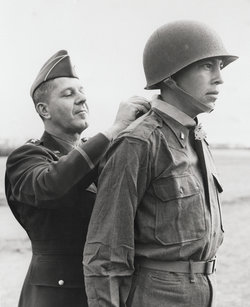Monuments
Ernest Childers, 45th Division Display
180th Infantry Regiment, 45th “Thunderbird” Division Marker

2LT Earnest Childers of the 180th Regiment, 45th Infantry Division was awarded the Medal of Honor near Oliveto Citra during Operation Avalanche. He along with his high school Classmate,and fellow Native-American, LT Jack Montgomery, also of the 180th Regiment, were Medal of Honor recipients from the 45th Division. LT Montgomery earned his Medal of Honor at Anzio in February 1944. the Medal of Honor near Anzio in February 1944 (See 45th Division Plaque-Nettuno, this site for more info).
Childer’s OBITUARY from the March 5, 2005 Washington Post best sums up his incredible life:
Ernest Childers, 87, a Native American and Army veteran who received the Medal of Honor for his combat service in Italy during World War II, died March 17 at a hospice in Tulsa after strokes. He lived in Coweta, near Tulsa.
He was a second lieutenant in the 45th Infantry Division when he received the Medal of Honor, the highest military award for valor.
He arrived on the beaches of Salerno in early September 1943, after the invasion of Italy had begun. He learned that many in his division, which included his school friends, were pinned down by machine-gun fire in mountainous terrain near Oliveto.
On Sept. 22, he organized a group of eight soldiers to help clear the way so the division could advance. In the pre-dawn mist, he came under fire, fell into a shell crater and broke his ankle.
He crawled to an aid station, only to see it destroyed by an incoming shell. The doctor and several of Lt. Childers's friends perished.
"I crawled back and told my men to lay down a base of fire over me," he told an interviewer. "You see, I had to crawl because of my broken ankle. . . . I couldn't tell that as I was crawling, I was crawling up a slope of a hill. I came up behind one of the German machine gun nests that had us pinned down."
As the Germans were turning their machine guns toward Lt. Childers, he was quicker and shot them dead.
From his position, he saw a second nest and pitched in rocks to frighten the men manning it. "I assume they thought it was a hand grenade, because nobody throws rocks," he said.
When the Germans leapt out, he shot the first. Another U.S. soldier killed the second man.
According to his Medal of Honor citation, Lt. Childers single-handedly captured an enemy mortar observer at a house further up the hill. No further detail was added.
He later wrote a fuller description of what happened at that point:
"The German must have been watching the action, because when he came out toward me, I was on my knees training my 30 caliber carbine on him. I was yelling to one of my men, 'Take him prisoner!' My sergeant yelled back, 'Shoot the bastard!' I yelled, 'I can't, I'm out of ammunition.' "
"My body," he added, "was wet with sweat since the German was fully armed, and I was holding an empty rifle on him. That German was the only surviving German in the entire action of that day."
After recovering from his wounds in North Africa, he was sent back into combat and fought at the Battle of Anzio, where he was wounded again. While recovering in a military hospital in Naples, he received word that a general wanted to see him.
That panicked him. He thought: "What general sends for a second lieutenant?"
Awarded the Medal of Honor in Naples, he later came to Washington to meet with President Franklin D. Roosevelt.
Ernest Childers was born Feb. 1, 1918, in Broken Arrow, Okla., and raised on a farm that was part of his father's original Creek tribal allotment.
He was the third of five sons and the best shot, having been taught by his father, a Creek Nation lawyer and a great hunter.
After his father died, he was responsible for feeding the family during the Depression years. His mother gave him one .22-caliber cartridge every day to kill a rabbit for dinner.
"I got to be a very good aim," he told a Tulsa reporter in 2002. "Because if I missed, we didn't eat."
He graduated from the Chilocco (Okla.) Indian School, where he boxed and learned mechanics. He joined the Oklahoma National Guard in 1937 to earn extra money, and his unit was activated during World War II.
Remaining in the Army after the war, he later taught jungle training in Panama and winter training in Alaska before retiring in 1965 as a lieutenant colonel.
A brief stint with the Job Corps program in Washington ended after he suffered a heart attack. Returning to Oklahoma, he spoke to students about the emotional costs of war.
After the Sept. 11, 2001, terrorist attacks, he wrote a widely circulated statement condemning vigilante attacks on Arab Americans.
"Even though I have darker skin than some Americans, that doesn't mean I'm any less patriotic than any other American," he wrote. "I am appalled that people who call themselves 'Americans' are attacking and killing other Americans simply because of their hair and skin color."
